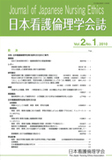Japanese
English
- 販売していません
- Abstract 文献概要
- 参考文献 Reference
- サイト内被引用 Cited by
この論文の目的は、末期患者に対する人工栄養・水分の補給と中止に関する看護師の語りから、改めて患者中心の看護を考えることにある。著者が患者中心の看護に疑問をもった語りを分析した。その結果、看護師の語りの背景には「死の共同性」「わたしの死」「人となりという自然」が関係していると考えられ、看護師は時代に伴って変化する死の意味を実践経験から知っており、患者中心というよりその経験を生かして援助していた。
患者中心の看護は疾患・治療中心から転換した専門職化に伴う概念であり、現在では看護実践の目標、倫理的行為の基準となっているが、援助の幅を広げるには患者中心の看護にこだわらないアプローチも可能である。
The paper throws a light into the concept of patient-centered nursing from the narratives of nurses regarding withdrawing and withholding artificial food and fluid in terminally ill patients. The nurses who raised questioned the ‘patient-centered nursing’ has the underlying feeling of ‘communality of death’, ‘my death’ and ‘one's nature’. Those nurses knew the meaning of death that evolved over time and were caring for the patients based on their clinical experience rather than relying on the concept of ‘patient-centeredness’. While patientcentered nursing is the standards of ethical conduct in today's nursing shifted from the historical disease/cure oriented model those nurses’perceptions suggested the possibility of different care approach.
Copyright © 2010, The Japan Nursing Ethics Associatin. All rights reserved.


